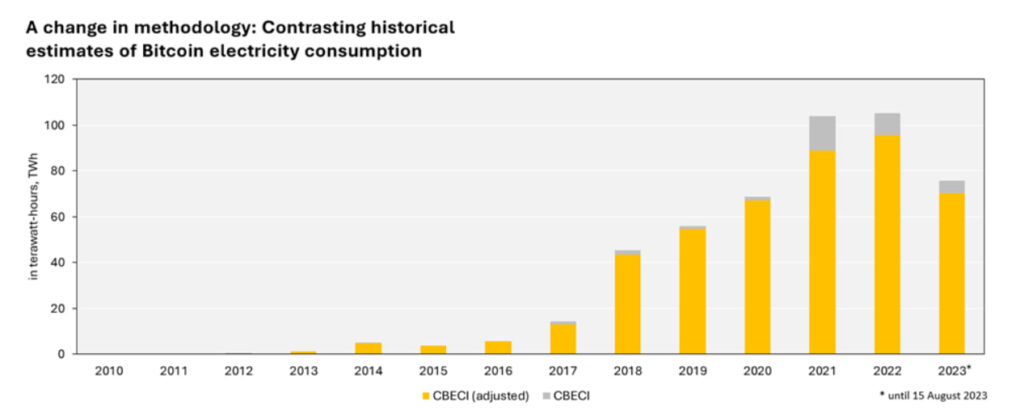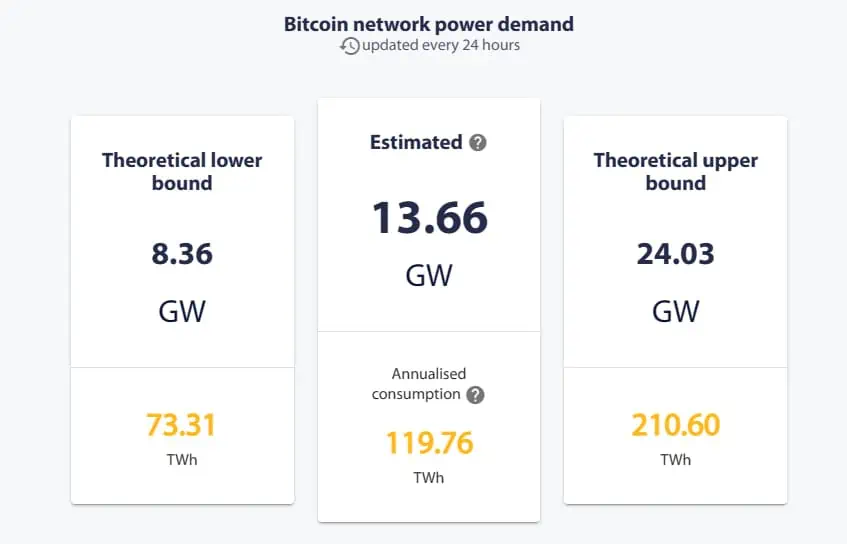
According to the Cambridge University Centre for Alternative Finance (CCAF), Bitcoin mining consumes less energy than previously estimated.
After updating its methodology for determining the energy consumption of the Bitcoin network, the Bitcoin Consumption Index estimates that the blockchain network uses about 70,4 terawatt hours (TWh), revising downwards its previous consumption estimate of 75,7 TWh.

Through a publication Shared on their website, CCAF researchers explained that the index has been updated in relation to advances in specialized Bitcoin mining hardware, known as ASICs.
CCAF updates its methodology
Researchers commented that along with the growing popularity and global expansion of Bitcoin, mining hardware for the cryptocurrency has also evolved, becoming more powerful and efficient. Thus, although Bitcoin mining has completely moved away from the use of modest computing equipment such as CPUs, which were used at the beginning of the network, new generations of mining hardware implement super-small semiconductors that significantly reduce the energy demand for data transmission.
Now that the Bitcoin Consumption Index has been updated, these are included new mining hardware models, which are more powerful and efficient, and their Technical specifications, to reflect the blockchain network's annual electricity consumption estimates more accurately.
Likewise, the new CCAF energy consumption estimation model also considers the type of energy used by Bitcoin miners, the researchers said.
In the post, they also noted that revising their estimation methods in the Bitcoin Consumption Index was necessary to provide more accurate and reliable information on the network's energy usage and avoid biased perspectives on the topic at hand.
What is the Bitcoin Energy Consumption Index?
The Bitcoin Energy Consumption Index, or CBECI, is a tool developed by CCAF to provide an estimate of the annual electricity consumption required by the Bitcoin network worldwide.
This index is based on a model that considers several factors, including the number of active miners on the network, the type of mining hardware used, the energy efficiency of the equipment, the power source, and the price of electricity.
In general, the CBECI presents three possible scenarios for the network's energy consumption. The first, the Theoretical lower bound, represents Bitcoin's energy consumption assuming that all miners use the most efficient hardware. The second, the Estimated, represents the most realistic energy consumption of the network. Finally, the Theoretical upper bound averages the maximum possible energy consumption if miners were to use the least efficient hardware.

Source: CBECI
At the time of writing this article, Bitcoin's energy consumption represents only 0,54% of global energy consumption.
Bitcoin uses less energy than dryers in the US
Prior to the CBECI update, several researchers, such as ESG investor Daniel Battten, questioned the reliability of the index as it failed to consider important aspects of Bitcoin mining, such as the use of renewable energy sources or the use of surplus energy in various regions by miners. Furthermore, the previous methodology used by the CCAF weighted all mining hardware equally, without considering its technical specifications, such as lifespan and energy efficiency.
The CCAF said it had considered all these views and comments from stakeholders to revise its methodology and provide more accurate data as well as a broader understanding of the implications of this industry on the environment and society at large.
Regarding Bitcoin energy consumption data for last year, CCAF noted that after the aforementioned updates, the Bitcoin network's energy expenditure rose from an estimated 105,3 TWh to 95,5 TWh for the whole of 2022, a figure that is equivalent to 0,38% of global electricity consumption and is much lower than the energy consumption produced by dryers in the United States, of 108 TWh, the center said.
JPMorgan lowers estimated cost of mining 1 BTC
Separately, a week after the index update, JPMorgan, one of the world's largest private banks, also updated its estimate of the average cost of producing a bitcoin.
According to the bank, mining a bitcoin currently costs around $18.000, which represents a 14,2% reduction from its previous production cost estimate of $21.000.
Continue reading: Bitcoin miners are increasingly using green energy



